 | | | 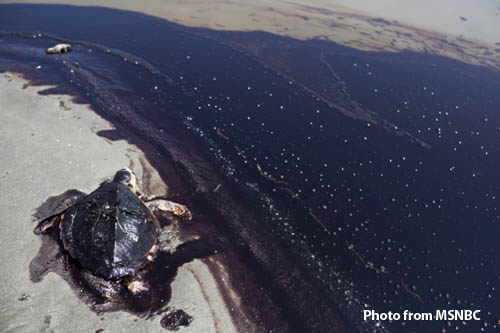 I was a bright-eyed, 10-year-old when one morning, I started seeing images of blackened birds, fish, and turtles all over the tv when my mom and dad would watch the news. “There’s been an oil spill,” they explained. I’d never seen oil before with the exception of the occasional leak beneath my dad’s 14-year-old, tan sedan. I remember feeling sick thinking about those seabirds with their wings cruelly glued together with toxic sludge, dead fish washing up in droves on the shore, and turtles sick and poisoned from that evil black sea ink. I was a bright-eyed, 10-year-old when one morning, I started seeing images of blackened birds, fish, and turtles all over the tv when my mom and dad would watch the news. “There’s been an oil spill,” they explained. I’d never seen oil before with the exception of the occasional leak beneath my dad’s 14-year-old, tan sedan. I remember feeling sick thinking about those seabirds with their wings cruelly glued together with toxic sludge, dead fish washing up in droves on the shore, and turtles sick and poisoned from that evil black sea ink.
The nightmare fuel for marine lovers continues to wreak havoc across the coastlines. After last year’s devastating spill in California, environmental groups have made progress shutting down these dangerous drillers from coast to coast. Environmental groups have successfully brought several lawsuits against oil companies and government agencies alike and as a result, California is considering banning drilling along the coastlines all together, which would be a huge step forward towards clean beaches, happy marine habitats, and climate mitigation. At the federal level, the Interior has also taken steps to save parts of the ANWR from drilling permanently. On the Gulf Coast, a federal court ruled to shut down a portion of the new federal drilling leases for their negligent environmental impacts. Marine advocates can celebrate other progress towards healthy, happy oceans. Manatee rehabilitations programs are in full swing in Florida, microbes can fight plastic pollution, and Louisiana is embracing offshore wind in the Gulf. | | | | | | | | A Messy Energy Transition, Literally | | | | | | U.S. Judge Annuls Gulf of Mexico Oil Auction Over Climate Impact A federal judge invalidated the results of an oil and gas lease sale in the Gulf of Mexico on Thursday saying the Biden administration failed to properly account for the auction's climate change impact. The decision has cast uncertainty over the future of the U.S. federal offshore drilling program, which has been a big source of public revenue for decades but also drawn the ire of activists concerned about its impact on the environment and contribution to global warming. | | | | | | Louisiana Company to Pay $43 Million for Longest-Running Oil Spill in U.S. History Taylor Energy’s undersea wells have been leaking into the Gulf of Mexico since 2004, when they were damaged by Hurricane Ivan. The Department of Justice announced on Wednesday that Louisiana-based Taylor Energy will pay $43 million in civil penalties and damages for a leak in the Gulf of Mexico that has been releasing oil since 2004, the longest-running spill in U.S. history. As part of the settlement, Taylor Energy will also transfer to the Department of the Interior control of $432 million remaining in a trust fund dedicated to cleaning up the spill. | | | | | | Indigenous Advocates in Florida Say Oil Drilling in Big Cypress Will Destroy Sacred Sites Environmental advocates and Indigenous people are concerned the drilling will destroy the wetlands, pave over acres of wildlife, divert water, and more. On an early April morning last year, Betty Osceola, a member of the Miccosukee Tribe of Indians, led a group of 50 people through the marshy swamp of South Florida’s Big Cypress National Preserve for six hours. | | | | | | The American Petroleum Institute Wants a Greener Future, as Long as it Has More Oil and Gas Once again, the American Petroleum Institute is attempting to paint itself as a climate savior – and not doing it very convincingly. On Wednesday, the dominant fossil fuel lobbying group held an hourlong press conference about its annual State of American Energy report during which various API executives touted the fact that the United States has maintained its position as a net exporter of oil and gas despite the general chaos of the COVID-19 pandemic; the “growing diversity” of the oil and gas workforce. | | | | | | U.S. Moves to Restrict Oil Leasing in Alaska Interior plan would put 11 million acres on the North Slope off limits to new oil and gas leases. The Interior Department said Monday that it plans to block oil and gas leasing on about 11 million acres on Alaska’s North Slope, or roughly half of a 23-million acre reserve set aside for energy development decades ago. The action, announced in connection with a federal lawsuit brought by environmentalists, would reverse a Trump administration effort to expand oil production in the National Petroleum Reserve in Alaska. | | | | | | Our Views: Welcoming the Winds of Change to Louisiana's Energy Industry Talking about the world’s demand-driven shift from polluting fossil fuels to cleaner forms of energy, Gov. John Bel Edwards has called on Louisianans not to wax nostalgic for the state's longtime economic driver but to “embrace the transition.” When it comes to offshore wind energy — now booming in places like the Northeast and likely coming soon to the Gulf of Mexico — we’re encouraged that some locals are way ahead of him. | | | | | | | | The Ocean Needs Our Help — Now Coastal communities, from those of Native Alaskans to condo residents in south Florida, are on the frontlines for rising sea level impacts. Our two organizations, Blue Frontier and the Center for the Blue Economy, were among the first, in 2019, to highlight how our public seas must play a central role in national climate policy. The ocean, after all, is the planet’s major sequesterer of heat and carbon, as well as the source of vast quantities of carbon-free energy from winds, tides and currents. | | | | | | Opinion: Humanity Should Not Test Whether Antarctica’s Ice Will Hold Out The world’s massive ice stores are melting, and researchers are only beginning to evaluate what that means. This is but one of so many signals that climate change will not wait until it is more convenient for humanity to face it; world governments must tackle the problem now. In Antarctica, a major bulwark against rapid ice disintegration “is likely to shatter into hundreds of icebergs,” according to Oregon State University’s Erin Pettit, who presented this month new satellite images showing that the eastern ice shelf abutting the massive Thwaites Glacier is cracking and could break up within the next few years. | | | | | | Opinion: Want to Save the Oceans From Climate Change? Support This Bill Now. The Ocean-Based Climate Solutions Act of 2021 now before Congress gives us a good place to start. After years spent at a local break, every surfer develops an internal dataset. If we even think about suiting up, we check the daily water temperature, tide, swell size, period and wind direction. Sometimes we question the grumpy old locals’ dataset when they claim their break “used to be way better,” but perhaps a margin of error for nostalgia needs to be factored in. What we do know for certain, however, is that the ocean and our local beaches are changing, and fast. | | | | | | | | These Whales Are So Decimated That a Single Birth Was Cheered By Scientists Slalom the North Atlantic right whale, survivor of multiple deadly fishing net entanglements, gave birth. But can mother and calf survive dangerous, human-infested waters? In the ocean off South Carolina, researchers spotted something attached to Slalom the North Atlantic right whale, and for once, it was a good thing. She had a baby. A sigh of relief spread across the community of Atlantic whale watchers who know critically endangered right whales are as likely to die as they are to give birth. | | | | | | Florida Has Lost Miles of Seagrass. A New Bill Would Make it Easier to Build Over Those Meadows A bill that would make building over Florida’s beleaguered seagrass meadows easier is drawing opposition from conservationists and environmental regulators. If passed by Florida lawmakers, the bill would create seagrass mitigation banks on submerged public lands. The state would grant easements to private companies to grow and manage the seagrass, then sell credits to landowners building projects such as marinas or docks or dredging channels that would harm the state’s disappearing seagrass. | | | | | | We Saved the Puffins. Now a Warming Planet is Unraveling That Work "Seabirds are climate change prisoners. Our inaction makes us the executioners." I stepped onto the battlefield of climate change, sidestepping carcass after carcass. In the grass were the remains of Arctic terns, common terns, and roseate terns. Along the boulders, researchers pointed out dead puffin chicks. As other climate war zones smolder with wildfire embers, are strewn with flattened homes, or marked by bleached coral, the signature of conflict on a seabird island in the Gulf of Maine is a maddening quietude. | | | | | | Save the Manatees, Please! | | | | Record Manatee Deaths Cause Florida to Try Feeding Program More than 1,000 manatees died in Florida waters in 2021 as water pollution hurt their food supply. As winter begins in Florida, a new feeding plan could save many manatees from starvation. But they will still face the long-term threat of man-made water pollution stifling their food supply, wildlife officials said. The slow-moving marine mammals will soon begin to gather at warm-water sites, such as power plants, as the ocean temperatures cool, and there may not be enough sea grass to sustain them, officials told the state Fish and Wildlife Conservation Commission. | | | | | | Manatee Feeding Experiment Starts Slowly as Cold Looms An unprecedented, experimental attempt to feed manatees facing starvation in Florida has started slowly but wildlife officials expressed optimism Thursday that it will work as cold weather drives the marine mammals toward warmer waters. A feeding station established along the state’s east coast has yet to entice wild manatees with romaine lettuce even though the animals will eat it in captivity, officials said on a news conference held remotely. | | | | | | Saving the Manatees — Rescue By Rescue, Rehab By Rehab Florida is scrambling to prevent another horrific year of starvation deaths among the beloved mammals On an unusually cold winter morning in central Florida, Corleone the manatee was awakened before dawn by wetsuited workers who slipped into his pool at SeaWorld and wrapped him in a long vinyl sling. A crane slowly hoisted him out of the water and carefully lowered him to the rear door of an empty box truck, where other staff pushed, pulled and slid their “manatee burrito” inside. Two hopped in to keep Corleone company on his latest journey. | | | | | | | | Plastic Ocean Project Working to Protect Biodiversity of the Carolina Coastline From Plastic Pollution Plastic Ocean Project (POP) is a nonprofit that tries to create awareness about plastics in our oceans and they’re hosting a fundraiser later this month at the N.C. Aquarium at Fort Fisher. According to the organization’s website, the nonprofit’s mission is to educate through field research, implement progressive outreach initiatives, and incubate solutions to address the global plastic pollution problem, working with and for the next generation to create a more sustainable future. | | | | | | New Studies Show Microbes Are Evolving to Eat Plastic “The global microbiome’s plastic-degrading potential correlates strongly with measurements of environmental plastic pollution – a significant demonstration of how the environment is responding to the pressures we are placing on it.” Across the globe, microbes in oceans and on land are evolving to degrade plastic, a new study has found. The study, published in the journal of Microbial Ecology by researchers at Chalmers University of Technology in Sweden, found 30,000 different enzymes capable of degrading 10 types of plastic. It’s the first large-scale study of bacteria’s plastic-degrading potential. | | | | | | A Commonsense Proposal to Deal With Plastics Pollution: Stop Making So Much Plastic A report from leading scientists found that the U.S. is the world’s leading generator of plastic waste, at 287 pounds per capita. It’s clogging the oceans, and poisoning plankton and whales. The United States leads the world in the generation of plastic waste and needs a comprehensive strategy by the end of next year to curb its devastating impacts on ocean health, marine wildlife and communities, a new report from the National Academies of Sciences, Engineering, and Medicine concludes. | | | | | | World’s Warmest Waters, What Does it Mean? | | | | Ocean Warmth Sets Record High in 2021 as a Result of Greenhouse Gas Emissions Since the late 1980s, Earth’s oceans warmed at a rate eight times faster than in the preceding decades The warmth of the world’s oceans hit a record. Again. A new analysis, published Tuesday in the journal Advances in Atmospheric Sciences, showed that oceans contained the most heat energy in 2021 since measurements began six decades ago — accelerating at a rate only possible because of human-emitted greenhouse gases. | | | | | | Ocean Temperatures: Climate Warning for New England New England’s historical and cultural identity is inextricably linked to the ocean that laps at nearly 6,200 miles of coastline. And the region’s ocean waters are warming, and not just a little. The chart shows just how much the ocean has warmed over the past 65 years and, due to the accumulation of greenhouse gases, the heat dumped into the ocean has doubled since 1993. It is even more concerning that ocean warming has accelerated since 2010. | | | | | | Arctic Report Card: Climate Change Transforming Arctic into ‘dramatically different state’ NOAA’s 2021 Arctic Report Card documents the numerous ways that climate change continues to fundamentally alter this once reliably-frozen region, as increasing heat and the loss of ice drive its transformation into a warmer, less frozen and more uncertain future. This year’s Arctic Report Card is the 16th annual volume of original, peer-reviewed environmental observations and analysis that documents rapid and dramatic shifts in weather, climate, terrestrial and oceanic conditions in the circumpolar region. | | | | | | | | | | 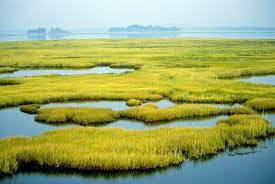 Celebrate World Wetlands Day February 2nd Celebrate World Wetlands Day February 2nd
Coastal wetlands are a wonderworld of marine life and climate miracles! Even though your mind may be fixated on a particular groundhog, take time on February 2nd to learn more about wetlands and the critical role they play in our marine environment HERE. Also, if you want to spend the day celebrating with other marine enthusiast you can find clean up events in your area and online seminars HERE. Together with collective action and education, we can protect these gems along our coastlines! • • • • • 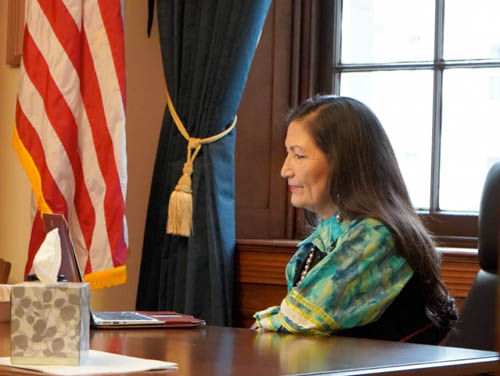 The Biden Administration has taken steps to improve how our federal lands are used for energy production, recently adding permanent protections for parts of the ANWR and opening up the largest federal offshore wind leasing sale to take place in the coming months. But we can do more. Last summer, the administration placed a temporary pause on federal drilling leases, but they went back on this environmental progress by leasing out thousands of square miles of Gulf coast to greedy fossil fuel drillers. Even a federal judge ruled that some of these leases were ILLEGAL for their projected environmental impacts! We must do better. The Biden Administration has taken steps to improve how our federal lands are used for energy production, recently adding permanent protections for parts of the ANWR and opening up the largest federal offshore wind leasing sale to take place in the coming months. But we can do more. Last summer, the administration placed a temporary pause on federal drilling leases, but they went back on this environmental progress by leasing out thousands of square miles of Gulf coast to greedy fossil fuel drillers. Even a federal judge ruled that some of these leases were ILLEGAL for their projected environmental impacts! We must do better.
On average, offshore drilling operations spill 157,000 barrels of oil every year. That equals 10 Olympic swimming pools of oil ruining our ocean ecosystems every year. Oil drilling is also a huge contributor to climate change. It’s estimated that offshore drilling platforms emit about half a teragram (Tg) of methane each year. That’s equivalent to driving a car 31 billion miles! We must put a stop to these dangerous and deadly operations. Tell Deb Haaland to stop federal drilling leases HERE. | | | | | | | | | | | 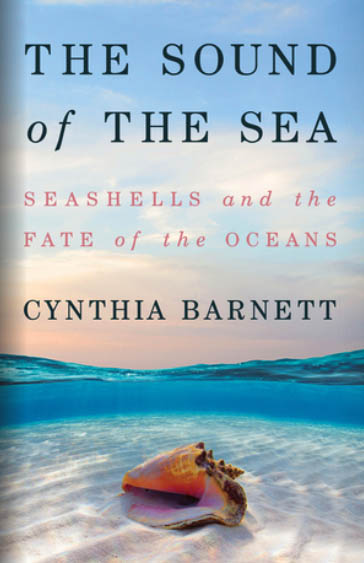 Rachel Carson would have loved The Sound of the Sea. With it, Cynthia Barnett has arrived, borne upon a Botticelli shell, as a true heir to Carson’s legacy. The luminous prose in Carson’s first book, Under the Sea-Wind, carries readers along the Atlantic seacoast with birds and bivalves, on epic avian migrations to the Artic tundra, to the lives beneath the waves of marine creatures – mackerel and mullets, cephalopods and sharks, eels and octopuses. It was researched and written before there was Technicolor, Jacques Cousteau, the aqualung, or underwater film. Similar wonder, imagination, awe, and empathy for strange living creatures suffuses Barnett’s beautifully wrought homage to mollusks. Their lives – cowries, conchs, clams, moons, whelks, scallops – have created the beautiful shells and curio shop stuff that have fascinated humans and influenced human society since prehistoric times. Rachel Carson would have loved The Sound of the Sea. With it, Cynthia Barnett has arrived, borne upon a Botticelli shell, as a true heir to Carson’s legacy. The luminous prose in Carson’s first book, Under the Sea-Wind, carries readers along the Atlantic seacoast with birds and bivalves, on epic avian migrations to the Artic tundra, to the lives beneath the waves of marine creatures – mackerel and mullets, cephalopods and sharks, eels and octopuses. It was researched and written before there was Technicolor, Jacques Cousteau, the aqualung, or underwater film. Similar wonder, imagination, awe, and empathy for strange living creatures suffuses Barnett’s beautifully wrought homage to mollusks. Their lives – cowries, conchs, clams, moons, whelks, scallops – have created the beautiful shells and curio shop stuff that have fascinated humans and influenced human society since prehistoric times.
Seen as a whole, Rachel Carson’s work combines the wondrous prose and empathy so vividly on display in Under the Sea-Wind, with a deep, scientific exploration of the sea and its origins, the evolution of all life and the creatures we collect or admire, along with the disastrous effects on our planet and our lives that human hubris has produced. Her intertwined narrative first introduced the broad American public to ecology and its connection to human health. Carson is able, finally, in Silent Spring, to move and outrage us even at the death of a single backyard robin. Cynthia Barnett has done the same for the seashell. Carson was hobbled by health problems, burdened as a single woman by providing and caring for her entire extended family, and unable to travel widely. She mainly bird watched, plumbed tidal pools, combed Atlantic beaches. The rest of her magic came from relentless research, wide reading, frequent correspondence with experts, and that miraculous ability to make her readers see and, most of all, to feel. Barnett has done that, too. Read more • • • • • 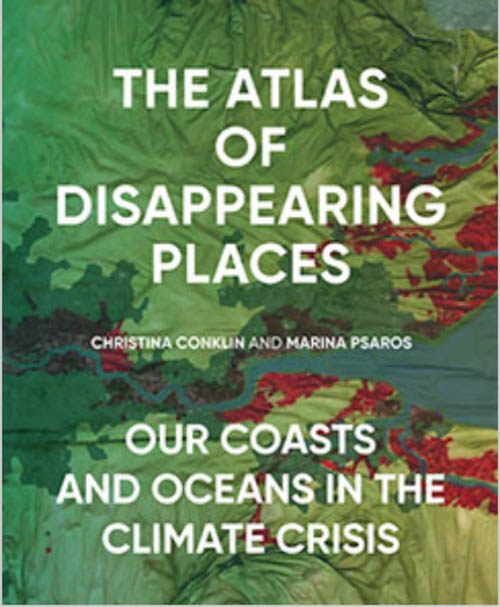 Review from The New Press: “Our planet is in peril. Seas are rising, oceans are acidifying, ice is melting, coasts are flooding, species are dying, and communities are faltering. Despite these dire circumstances, most of us don’t have a clear sense of how the interconnected crises in our ocean are affecting the climate system, food webs, coastal cities, and biodiversity, and which solutions can help us co-create a better future. Review from The New Press: “Our planet is in peril. Seas are rising, oceans are acidifying, ice is melting, coasts are flooding, species are dying, and communities are faltering. Despite these dire circumstances, most of us don’t have a clear sense of how the interconnected crises in our ocean are affecting the climate system, food webs, coastal cities, and biodiversity, and which solutions can help us co-create a better future.
Through a rich combination of place-based storytelling, clear explanations of climate science and policy, and beautifully rendered maps that use a unique ink-on-dried-seaweed technique, The Atlas of Disappearing Places depicts twenty locations across the globe, from Shanghai and Antarctica to Houston and the Cook Islands. The authors describe four climate change impacts—changing chemistry, warming waters, strengthening storms, and rising seas—using the metaphor of the ocean as a body to draw parallels between natural systems and human systems. A beautiful work of art and an indispensable resource to learn more about the devastating consequences of the climate crisis—as well as possibilities for individual and collective action—The Atlas of Disappearing Places will engage and inspire readers on the most pressing issue of our time.” | | | | | | 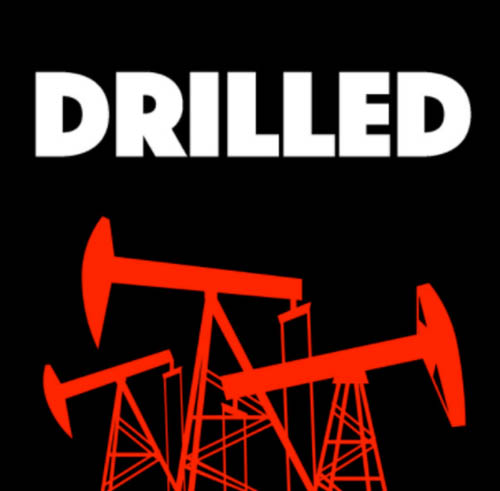 Drilled, Podcast by Critical Frequency Drilled, Podcast by Critical Frequency
The environmental sagas of the oil wars are brought to you by award-winning investigative journalist, Amy Westervelt, in this groundbreaking podcast by Critical Frequency. Learn the ins and outs, triumphs and downfalls of the oil and gas industry in the U.S. and uncover the frightening truth about the environmental impacts of fossil fuels. Designed like a true crime podcast, this series is not for the faint of heart. These treacherous tales of the environment’s nightmare industry will have you on the edge of your seat. Experience the podcast here. | | | | | |  Audrey Magnuson, RCC Presidential Fellow Audrey Magnuson, RCC Presidential Fellow
Audrey Magnuson co-leads RCC’s Coasts and Ocean program and works on environmental justice and policy. She is a senior at Duke University majoring in Public Policy with minors in Environmental Science and Art History. audrey.magnuson@duke.edu | | | | | | | | | |  The Rachel Carson Council Depends on Tax-deductible Gifts From Concerned Individuals Like You. Please Help If You can. The Rachel Carson Council Depends on Tax-deductible Gifts From Concerned Individuals Like You. Please Help If You can. | | | |  Sign Up Here to Receive the RCC E-News and Other RCC Newsletters, Information and Alerts. Sign Up Here to Receive the RCC E-News and Other RCC Newsletters, Information and Alerts. | | | | | | | | | | | |